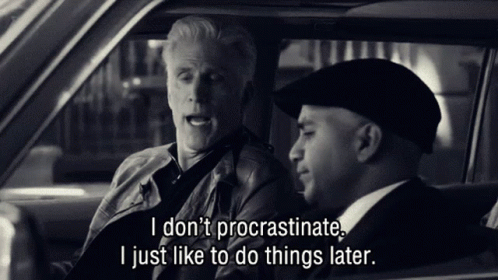4|1|25Hey, Gem. Zhara here, and I’m back with another one.
Let’s jump into it.
The Thief of Time x Zhara. J.
★
We’ve all been there. Yup! All of us. We sit down to work on something important: a project, personal goal, or maybe even that dream we’ve been holding close to our hearts since we were kids, only to suddenly decide that it’s the perfect time to organize our closet, scroll social media, or deep-clean our kitchen. The next thing we know, hours have passed, and our dreams and goals… are still being abandoned.
Hey, Gem, don’t hate the messenger.
Procrastination is often mistaken for laziness, but it’s far more complex than that. It’s a sneaky, self-sabotaging habit that holds us back from our full potential. And what’s worse is that it often feels like we’re aware of the damage it’s doing, but we keep putting things off anyway.
Ouch, I know!
Procrastination is less about being lazy and more about emotional regulation. According to Dr. Tim Pychyl, a psychology professor at Carleton University, procrastination is a coping mechanism for emotional discomfort. When a task feels overwhelming, boring, or anxiety-inducing, we avoid it by distracting ourselves with something easier or more enjoyable (Pychyl, 2013).
What’s fascinating is that this avoidance offers temporary relief, but it comes at a long-term cost. The more we procrastinate, the more likely we feel stressed, guilty, and disappointed in ourselves. It’s a vicious cycle, Gem.
A 2014 study published in the Journal of Behavioral Decision Making found that chronic procrastinators often experience higher stress levels and lower well-being. Researchers noted that procrastination increases self-blame and reduces the sense of accomplishment, making it harder to take meaningful action (Sirois, 2014).
Procrastination doesn’t just delay tasks; it delays growth. Whenever we put off pursuing our goals, we rob ourselves of valuable opportunities. Whether it’s delaying that business idea or postponing creative work, procrastination stunts personal and professional development.
The stop-and-start pattern makes it harder to build momentum, which often results in unfinished projects and forgotten goals. The more we procrastinate, the more we begin to doubt ourselves. It chips away at our confidence and leaves us feeling incapable. There’s nothing more frustrating than knowing you’re capable of so much more but not following through.
Gem, let’s stop letting procrastination steal our potential.
Here are some ways we can fight back:
If a task feels overwhelming, commit to just five minutes. Often, once you start, the resistance fades, and you’ll keep going. Set clear and realistic goals, Gem. Vague goals make it easy to procrastinate. Instead of ‘work on my business,’ say ‘spend 30 minutes researching marketing strategies.’ You get what I mean? Get detailed and intentional.
Use timers or visual planners to stay on track. Seeing the time pass creates urgency and accountability. Many of us procrastinate out of fear of not doing something perfectly. Remind yourself: done is better than perfect.
Above all else, forgive yourself. A study published in Self and Identity found that self-forgiveness reduces future procrastination (Wohl et al., 2010). So, we should be kind to ourselves when we slip up.
★
So, Gem, if you’ve been putting off a goal, a passion project, or simply showing up for yourself, let this be your nudge. Stop putting your potential on hold.
Also, send this to someone else who needs the reminder.
Until next time, start before you’re ready. You’re capable of more than you’re giving yourself credit for. -Zhara. J.
Have you checked out SheIsTreasure’s Pinterest Board yet? We think you should. ♡
Interested in contributing a blog to SheIsTreasure? Our Write for Us Section has all the information you need.





